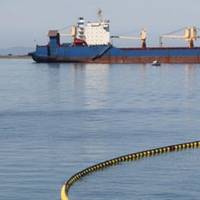New Report on Canada's Marine Oil Spill Response Capabilities

The report aims to improve Canada's system for ship-source oil spill preparedness and response in order to better protect the public and the environment. "I want to thank the panel for its detailed, thoughtful work, and the invaluable expertise they have brought to this critical issue," said The Honourable Lisa Raitt, Minister of Transport. "I look forward to studying the report, speaking with stakeholders about their views, and discussing it with my cabinet colleagues. The independent panel consulted with pan-Canadian industry stakeholders…
Canada Commits to Coastal Protection, Tanker Safety
The Minister of Transport reintroduced in the House of Commons the Safeguarding Canada’s Seas and Skies Act, an important piece of legislation first tabled in Parliament on March 18, 2013, as part of the government of Canada’s comprehensive measures to establish a World-Class Tanker Safety System. “As the Speech from the Throne reiterated this week, our government remains committed to protecting Canada’s coasts and shores and building a world-class tanker safety system in Canada”, said the Honorable Lisa Ratite, Minister of Transport. Proposed amendments to the Marine Liability Act will fill a critical gap in the current liability and compensation regime and implement a new international convention that covers incidents involving hazardous and noxious substances carried by ships.
Canada Commissions Maritime Pollution Risk Study

Harper government announces pan-Canadian risk assessment study on marine safety. The Honourable Denis Lebel, Minister of Transport, Infrastructure and Communities, today announced that Transport Canada, in collaboration with the Canadian Coast Guard and Environment Canada, is commissioning a pan-Canadian risk assessment study on readiness to respond to ship-source spills in Canadian waters. “Our government is working to protect the safety of Canadians and the environment,” said Minister Lebel. “Canada depends on marine shipping for jobs, economic growth and long-term prosperity.
WA Oil Transfer Rules Protect Waters
In September 2006, state lawmakers directed Washington Department of Ecology (Ecology) to adopt stringent oil transfer rules after 4,700 gallons of heavy fuel oil spilled during an oil transfer operation at Chevron-Texaco's Richmond Beach fuel terminal in December 2003. Swift currents drove the oil ashore on the Suquamish Tribe shellfish beds at Doe-kag-wats beach and salt marsh at Indianola in Kitsap County. In 2008, nearly 15 billion gallons of oil were transferred over Washington waters by ship, fueling facility, tank truck or rail, according to Ecology reports. That equals 1.7 million gallons an hour. Since the rules went into effect, Ecology has seen reductions in the amount of oil spilled. In 2008, only about 158 gallons were spilled to Washington waters during fuel transfers.
Unannounced Spill Drills Exceed Expectations
Four oil-handling facilities in Washington had unannounced spill drills sprung on them last week by the state Department of Ecology and all four passed. The four facilities that participated in the simultaneous drills were the BP Cherry Point Refinery in Ferndale, Shore Terminal in Tacoma, Tesoro Terminal in Port Angeles and ConocoPhillips-Yellowstone Pipeline in Spokane. Beginning around 10 a.m. on Wednesday, March 9, staff from Ecology, the U.S. Coast Guard and the federal Environmental Protection Agency arrived at the facilities and presented scenarios that called for the companies to notify appropriate officials, organize a command center, and assess what type of spill response was needed to protect the public, the environment and workers.
Washington: We Need More Spill Response Vessels
Shipping companies and oil-handling facilities should take immediate steps to increase the number of boats available to respond to oil spills in Puget Sound and along Washington's coast, according to Ecology Director Jay Manning. A newly released study commissioned by the Department of Ecology (Ecology) found that there are not enough vessels available to simultaneously deploy oil booms, transport oil-spill equipment and supplies, and provide other spill-response assistance needed during a major oil spill. "With as much shipping and tanker traffic as we have in Washington's waters, a significant oil spill is a very real threat, and we have to be able to stage a rapid and aggressive response effort," said Manning.
Washington State Bolsters Spill Prevention and Response
In anticipation of adopting new safeguards regarding oil transfers over water and early spill response requirements, the Department of Ecology (Ecology) has added new spill prevention inspectors, a spill responder and a contingency plan reviewer to oversee mobile oil facilities. For the first time, Ecology is stationing a vessel and oil-handling facility inspector and a hazardous material responder in Bellingham. Both positions will focus on prevention and response activities in Island, San Juan, Skagit and Whatcom counties. There are three oil refineries and two oil pipelines in the region that generate heavy ship traffic in northwest Washington. To prevent oil spills in the Puget Sound and lower Columbia River, the department has added four inspectors.
Ecology Proposes Spill Prevention and Response Readiness Rules
Washington waters and to improve response readiness. trucks and rail cars. facility and vessel operators who transfer oil to or from vessels. practices to prevent spills. required to deploy oil-spill containment boom prior to transferring oil. activities. that they can mount an effective, timely response if they spill oil. spill readiness drills.
Washington State New Contingency Plan Rules Proposed
The Washington State Department of Ecology released proposed Oil Spill Contingency Plan Regulations. The proposed rules would totally replace the current ones and are intended to ensure that ship owners and operators and oil handling facilities demonstrate they can quickly and effectively respond to oil spills. The proposed rule focuses on early spill response actions, staging response equipment throughout the state, and conducting scheduled and unannounced spill readiness drills. The Preliminary Cost Benefit Analysis estimates the annual cost of the proposed rule to be $6.8 million. Compliance benefits are estimated to be in the range of $20 million to $159 million (that is a large range and it assumes that these proposed rules would prevent an Exxon Valdez-type spill).






